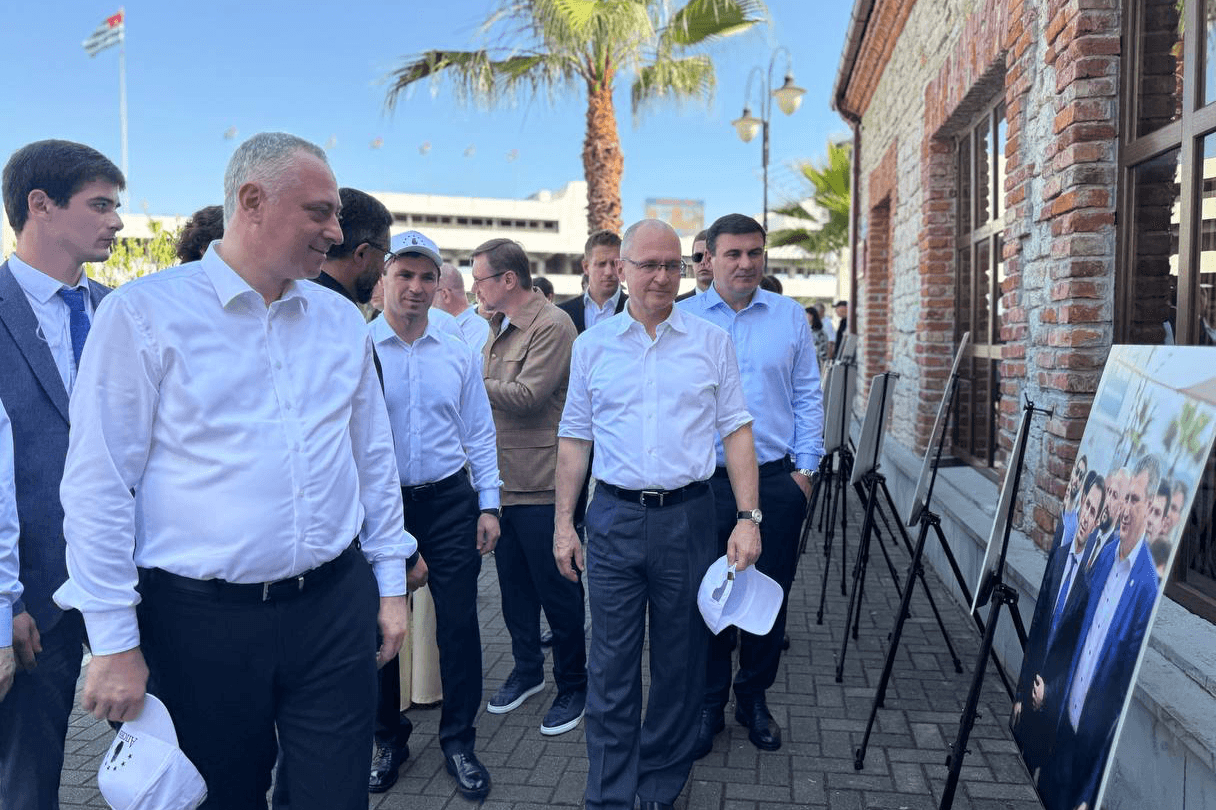
Sergei Kiriyenko, First Deputy Chief of Staff of the Russian Presidential Administration arrived in Abkhazia on Thursday, where he was received by President Badra Gunba.
During their meeting, the sides discussed key aspects of Abkhaz-Russian cooperation, including energy, taxation, education, and humanitarian projects.
Gunba stated that initiatives previously discussed in Moscow were ‘now being realised in practice’. Kiriyenko, for his part, said he was ‘glad to visit the land that is dear to me’ and noted that positive changes were already visible, though he added that more progress is still needed.
A key focus of the visit was energy. The meeting was attended by Russian Deputy Energy Minister Evgeny Grabchak, director of the state energy company Chernomorenergo Timur Dzhindzholia, as well as other representatives from Abkhazia’s government and its Ministry of Energy.
According to the Abkhaz authorities, Abkhazia faces critically high energy losses in the power grid, several times above Russian averages. Gunba described this as a ‘systemic problem hampering development’.
The sides agreed to end rolling blackouts during the upcoming winter and to draw up a plan for the modernisation of the power grid. Earlier, Russian engineers from RusHydro inspected the Perapadnaya HPP cascade in Gali District, a complex of four hydroelectric plants, of which only one — the Perapadnaya-1 with a 220 MW capacity — has been fully restored.
Kiriyenko stated that the goals included ensuring there were no blackouts this winter, improving the reliability of the energy infrastructure, and completing a full inventory of the grid.
In early July, Gunba asked Russian President Vladimir Putin to provide additional emergency electricity transfers to the region, which Putin reportedly agreed to.
The delegation also addressed education topics. Talks included plans to expand participation of Abkhaz youth in events and festivals held in Russia. Kiriyenko announced that, following a 10 May meeting between Gunba and Putin, Russia had decided to introduce additional salary supplements for teachers of both the Russian and Abkhaz languages.
Plans were also announced to launch the Childhood Navigators initiative in Abkhazia with Russian support, along with assistance for school administrators and the Ministry of Education. Childhood Navigators is a project of the Russia’s Education Ministry, which is being implemented within the framework of the federal project Patriotic Education of Citizens of Russia.
Kiriyenko and Gunba toured reconstruction work at the Brekhalovka waterfront area in Sukhumi (Sukhum). The sides discussed interim architectural improvements, including decorative facades to cover dilapidated buildings.
The delegation also visited the Amra yacht club and restaurant, where tourism infrastructure projects were presented.
During the walk, Abkhazian officials showcased plans for the renovation of the Dioscuri Embankment, which include restoring a historic fountain and installing new architectural lighting. A public vote on design proposals was announced.
The launch of a new maritime route between Sukhumi and Sochi was also discussed. A representative from Russian Sea Harbour (Rosmorport) announced that repairs to the Sukhum port would be completed by Sunday and that a test voyage would take place aboard the Kometa 120M hydrofoil.
Separately, the sides reviewed the ongoing rollout of PSB (Promsvyazbank) pension cards for elderly residents. Nearly 20,000 Russian pensioners living in Abkhazia have already received the new cards, which offer full functionality, including payments, transfers, and cashback. According to the PSB press service, cards have been issued at 12 branches across Abkhazia since 18 April.
As of early July, more than 24,000 individuals in Abkhazia were receiving Russian pensions, including over 4,000 people aged 80 and older. Kiriyenko noted that Putin’s directive had been largely fulfilled but stressed that all Russian pensioners residing in the region must be provided with the cards.
To conclude his visit, Kiriyenko and Gunba visited Achandara, the president’s ancestral village, where they laid flowers at a memorial to those who died during World War II. During his stay, Kiriyenko also visited several social, infrastructure, and cultural projects supported by Russian funding.
For ease of reading, we choose not to use qualifiers such as ‘de facto’, ‘unrecognised’, or ‘partially recognised’ when discussing institutions or political positions within Abkhazia, Nagorno-Karabakh, and South Ossetia. This does not imply a position on their status.











